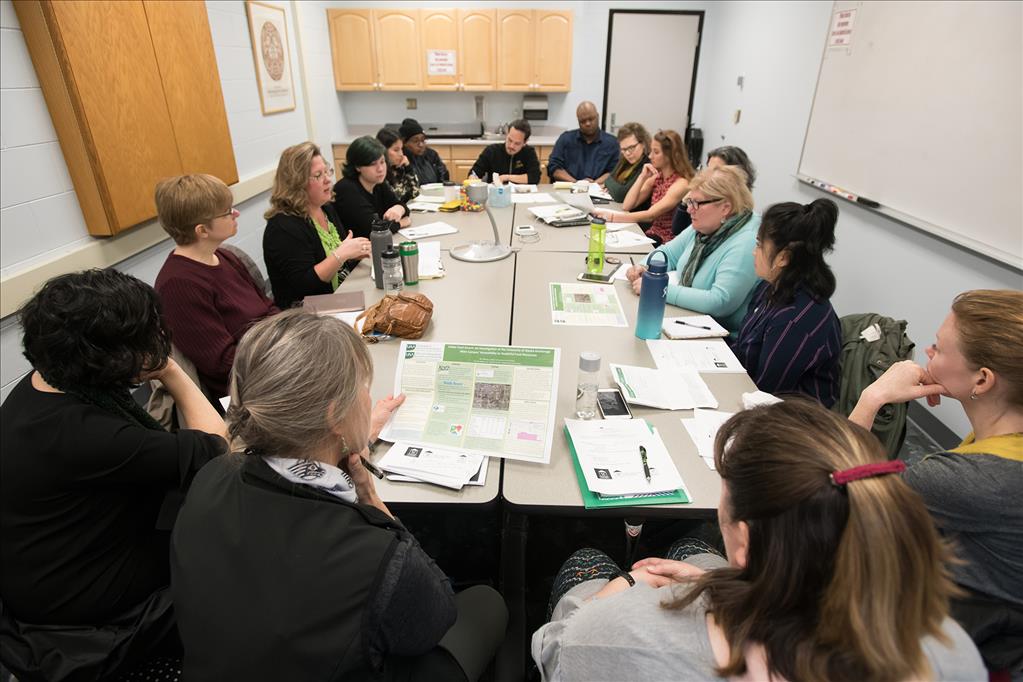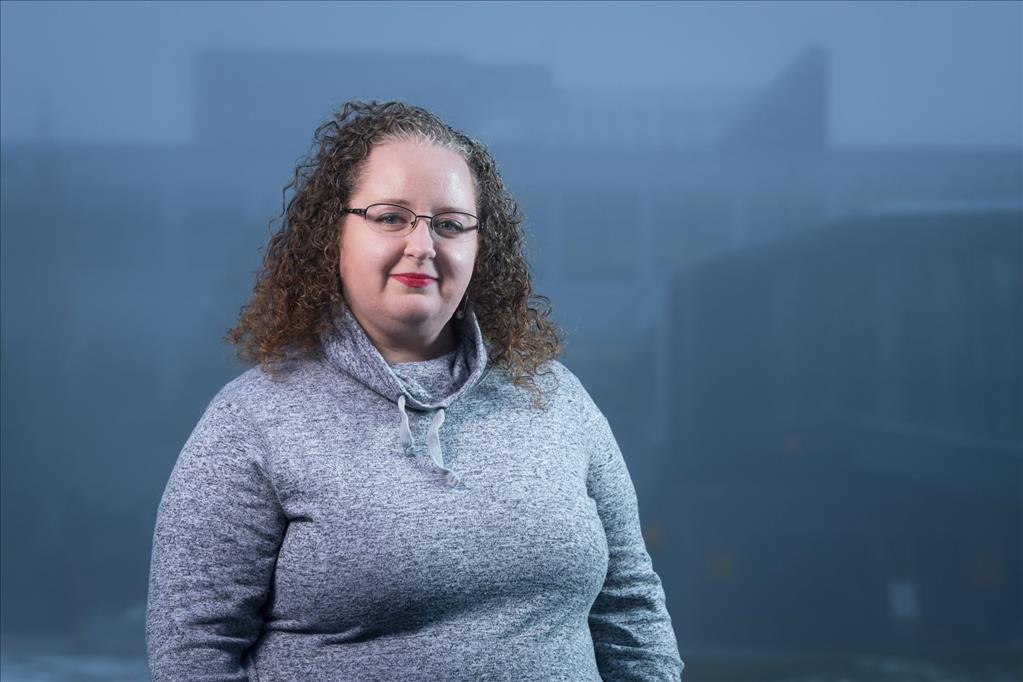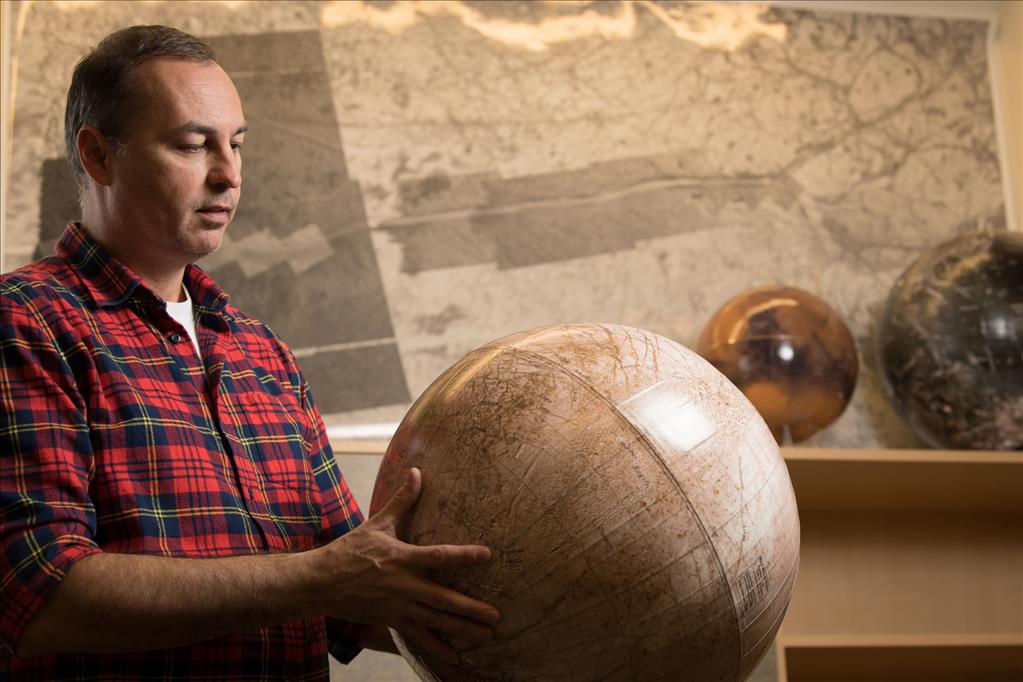Higher education: Teaching teachers with drones
by joey |

A teacher-piloted drone cruises over the school library at Goldenview Middle School during a UAA-partnered continuing education class. (Photo by James Evans / University of Alaska Anchorage)
Kids are our future, and the future is drones.
"It's going to be a tool in every job," said Lee Butterfield, who teaches one of the country's only high school drone classes. Whether his students at South Anchorage High School go on to jobs in engineering, journalism or biology, he knows drones will play a big role down the road. "Kids coming out of here with their [FAA] certification, it ups the level and the value they bring to any entity."
Known as unmanned aircraft systems, drones have made quick inroads in everyday life. Just a few years ago, they were extravagant novelties with awe-inspiring potential. Now, Walmart sells several models for less than $100.
As drones become more ubiquitous, the need for training becomes more important. It's illegal to fly above a crowd. It's also illegal to fly into Federal Aviation Administration airspace. But are drones sold with accompanying FAA maps and regulations? Rarely.
"There's a lot more to it than taking it out of the box and taking it up as high as it can go," said Beau Bivins, education coordinator at Advanced Aerial Education.
A UAA marketing and management alumnus, Bivins is also a co-owner of Alaska Aerial Media, which has used drones across Alaska for clients like Discovery Channel, National Oceanic and Atmospheric Administration and Alaska Department of Transportation.
"We want to make sure we're doing our part to educate everyone that's going to be in the industry," he said of the company's education arm. "It really creates a knowledgeable base of people who are going to be in this industry at many different levels."

Teachers learn to pilot a drone down the hallways during STEM Education: Unmanned Aerial Systems (UAS) Curriculum at Goldenview Middle School. (Photo by James Evans / University of Alaska Anchorage)
Nationwide interest in Alaska education
Advanced Aerial Education formed to meet both educational and occupational goals. Bivins and his business partner, Ryan Marlow, wanted to train more pilots. Butterfield wanted more opportunities for his media and broadcasting students. Together, they designed a curriculum that met both goals and launched an after-school program at South High

Butterfield, center, director of education at Advanced Aerial Education, works with teachers at Goldenview in the professional development course. (Photo by James Evans / University of Alaska Anchorage)
Soon after Alaska Dispatch News covered the program in 2016, Butterfield began receiving phone calls from curious teachers across the country. Advanced Aerial Education saw a chance to share their curricula. Their first priority, they decided, was to teach those teachers.
In partnership with UAA, Advanced Aerial Education now hosts a drone education course that counts as professional development for educators. Last summer, the company held its first three-credit class through UAA's Office of Professional and Continuing Education (PACE). Enrolled students met for two busy weeks in a downtown conference room, with flight tests at Delaney Park. (PACE, part of the College of Education, provides more than 400 professional development courses each year, which teachers need to recertify their licenses and to move up the pay scale in their career).
That first summer, teachers from Soldotna, Valdez and even Louisiana came to Anchorage to earn their professional development credits through UAA. A pair of government employees from Hawaii also enrolled; they now train interns to monitor their state's uninhabited islands.

Goldenview teachers study aeronautical charts and walk through drone equipment in the school library. (Photo by James Evans / University of Alaska Anchorage)
Flight time in the gym
Advanced Aerial Education ran their professional development course again this semester, at the request of Goldenview Middle School. Principal David Nogg invited all teachers to take the course, and everyone from language arts teachers, guidance counselors, and even the choir instructor enrolled. Over 12 weeks, teachers met after school in the library to work on drones and pore over flight maps.

Goldenview Middle School principal David Nogg flies a drone in the school library. (Photo by James Evans / University of Alaska Anchorage)
"I'm interested in being one of the teachers who's able to help out," said Roger David Jr., a choir instructor and UAA graduate. The teachers often end up laughing like their middle school students while flying in the gym or crashing cheaper intro drones in the hallway, he said, but there's heavy classroom material involved, too. To pass the class, teachers have to understand FAA maps and weather reports, take a timed knowledge test and handle mock client requests.
Ezra Gibson, also a UAA graduate, teaches language arts and coding at Goldenview. Several of his students have drones at home, he said, but that's a recreational setting. "You're not really going to inspire much ... until they see [drones] in school and realize the potential for it."
The training will support his coding courses, but Gibson has plans for language arts, too. "You can read, you can write, but there's always more to show them. More, in any class, is really important," he said. "Let's go outside, we'll take the drone up, we'll get a couple shots and we'll do descriptive writing based on what we saw," he suggested.
"From my standpoint, it's important for kids to have hands-on learning."

Goldenview teachers Roger David Jr., B.M. '15, M.A.T. '17, left, and Ezra Gibson, B.A '04, M.A. '07. (Photo by James Evans / University of Alaska Anchorage)
To recertification and beyond...
The Advanced Aerial Education drone course is a benefit for both the students and staff at Goldenview. Teachers move closer to recertification, and classes familiarize with a frequently misunderstood technology.
"If you're flying where planes fly, you should have the same responsibility and the same outlook operating in that space," Bivins said of his company's public education focus. "We can't administer the federal aviation test, but this gets [our students] to a point where they can walk out and be completely comfortable going to take that test."
That's not just helpful, but necessary, said Butterfield. Whenever someone uses a drone in the function of their job - even if they're a language arts teacher - that's considered commercial operation by the FAA.
The company will lead another two-week course this summer, and they're marketing it nationwide. Educators who enroll not only earn university credit through UAA, but get to fly drones in one of the most remarkable urban landscapes in the country. Those teachers can then pay to have Advanced Aerial Education tailor the curriculum to their classroom and region.
"We've really focused on educating in an educational setting," Butterfield added. "If every single kid now we're being educated on the right way to do this, we'd see less problems in the sky."

Students plot out three-dimensional airspace regulations over Southcentral Alaska. (Photo by James Evans / University of Alaska Anchorage)
Want to learn more? Visit Advanced Aerial Education's website for information. Follow Alaska Aerial Media on Facebook to see where the alumni-owned company is heading next.
Written by J. Besl, UAA Office of University Advancement
 "Higher education: Teaching teachers with drones" is licensed under a Creative Commons Attribution-NonCommercial 4.0 International License.
"Higher education: Teaching teachers with drones" is licensed under a Creative Commons Attribution-NonCommercial 4.0 International License.














